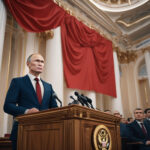In a bold move reflecting the intersection of social media and politics, Romanian authorities are considering a suspension of TikTok as they investigate its potential influence on upcoming elections. This decision highlights the scrutiny social media platforms face in the political arena, particularly in contexts where misinformation and external influence can sway public opinion and democratic processes.
The Context
As the country prepares for its elections, scheduled for this Sunday, Romanian officials are increasingly concerned about the power of social media platforms in shaping political narratives. TikTok, with its rapidly expanding user base and engaging video format, has become a focal point due to allegations that it may facilitate the spread of misleading information. Understanding the platform’s unique appeal, which resonates primarily with younger audiences, is crucial in addressing these concerns.
Romania’s move is not an isolated event but part of a broader global trend where governments eye the influence of digital platforms on political discourse. Other countries, including the United States and various European nations, have previously raised similar flags about social media’s role in elections, often grappling with balancing freedom of expression and safeguarding electoral integrity.
Investigations Underway
The proposed TikTok suspension will occur during an investigation into the platform’s impact on the Romanian electoral process. Authorities aim to determine if TikTok is being utilized to disseminate content that could potentially manipulate voters or skew public perception of candidates. Notably, this inquiry is set against a backdrop of political polarization in Romania, where social media can easily amplify partisan narratives.
An internal report from the Romanian government highlighted concerns regarding foreign entities using social media to influence elections. The report cites instances where misinformation campaigns were found to be in play across various platforms, indicating a growing need for regulation and monitoring of social media services during critical democratic exercises.
Global Parallels
Romania’s potential suspension mirrors actions taken by various nations grappling with foreign interference in their political landscapes. For example, during the U.S. presidential elections, platforms like Facebook and Twitter implemented moderation policies to combat misinformation. In contrast, India has faced similar challenges, where proposed bans on TikTok were rooted in national security concerns.
In studying these parallels, it’s evident that countries are attempting to navigate the complex relationship between digital platforms and the democratic process. The challenge lies in finding a proportional response that mitigates risks without inhibiting civic engagement and freedoms.
Public and Political Reactions
The proposal to suspend TikTok has ignited discussions among Romanian lawmakers and the general public. Some politicians are in favor of the suspension, arguing that it is essential to protect the democratic process. Others, however, express concern that such measures may infringe on civil liberties and curtail political expression.
Users of TikTok in Romania have voiced their apprehensions through various channels, illustrating a divide between those who view the platform as a vital space for discussion and creativity, and those who fear its potential for misuse in political campaigns. This discourse emphasizes the necessity for digital literacy and critical engagement among users to discern credible information from harmful propaganda.
The Way Forward
As the investigation unfolds, Romanian authorities must tread carefully. A blanket suspension of TikTok might quell immediate concerns but could also spark backlash regarding censorship. Stakeholders—ranging from government entities to social media companies—must engage in dialogue to develop comprehensive strategies aimed at promoting transparency, accountability, and responsible digital citizenship.
Possible measures include collaboration with TikTok to ensure fact-checking protocols are enforced, enhancing user education on misinformation, and establishing clear guidelines surrounding political content on the platform. Furthermore, focusing on fostering a resilient political culture that prioritizes informed decision-making among citizens can mitigate future concerns related to social media’s role in elections.
In conclusion, Romania’s consideration of TikTok’s suspension during the electoral examination highlights a precarious balancing act between protecting democracy and ensuring freedom in the digital space. As nations globally grapple with similar issues, robust discussions and innovative approaches are crucial in shaping a future where social media enhances political engagement rather than undermining it.












